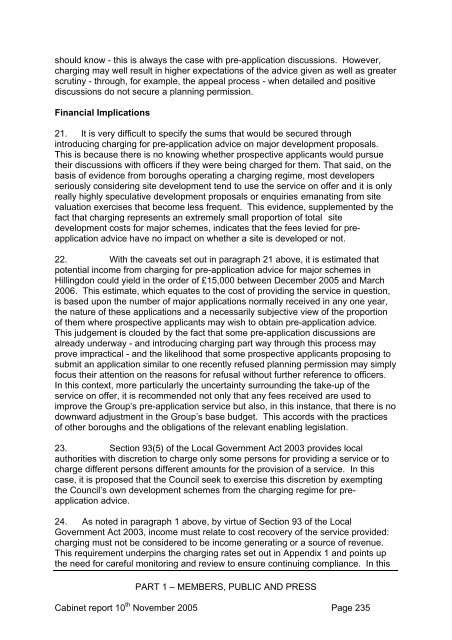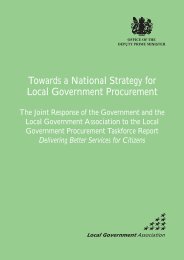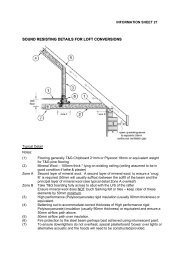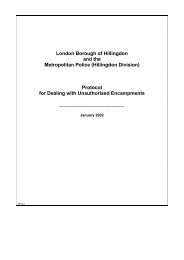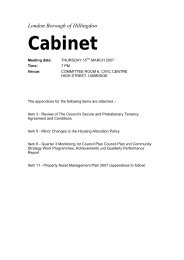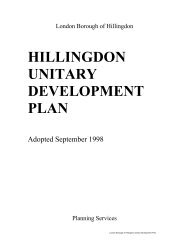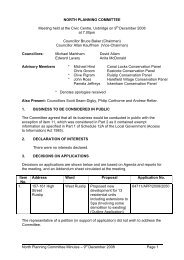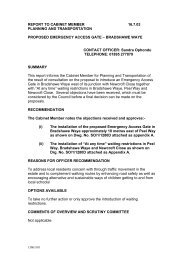Report - London Borough of Hillingdon
Report - London Borough of Hillingdon
Report - London Borough of Hillingdon
Create successful ePaper yourself
Turn your PDF publications into a flip-book with our unique Google optimized e-Paper software.
should know - this is always the case with pre-application discussions. However,<br />
charging may well result in higher expectations <strong>of</strong> the advice given as well as greater<br />
scrutiny - through, for example, the appeal process - when detailed and positive<br />
discussions do not secure a planning permission.<br />
Financial Implications<br />
21. It is very difficult to specify the sums that would be secured through<br />
introducing charging for pre-application advice on major development proposals.<br />
This is because there is no knowing whether prospective applicants would pursue<br />
their discussions with <strong>of</strong>ficers if they were being charged for them. That said, on the<br />
basis <strong>of</strong> evidence from boroughs operating a charging regime, most developers<br />
seriously considering site development tend to use the service on <strong>of</strong>fer and it is only<br />
really highly speculative development proposals or enquiries emanating from site<br />
valuation exercises that become less frequent. This evidence, supplemented by the<br />
fact that charging represents an extremely small proportion <strong>of</strong> total site<br />
development costs for major schemes, indicates that the fees levied for preapplication<br />
advice have no impact on whether a site is developed or not.<br />
22. With the caveats set out in paragraph 21 above, it is estimated that<br />
potential income from charging for pre-application advice for major schemes in<br />
<strong>Hillingdon</strong> could yield in the order <strong>of</strong> £15,000 between December 2005 and March<br />
2006. This estimate, which equates to the cost <strong>of</strong> providing the service in question,<br />
is based upon the number <strong>of</strong> major applications normally received in any one year,<br />
the nature <strong>of</strong> these applications and a necessarily subjective view <strong>of</strong> the proportion<br />
<strong>of</strong> them where prospective applicants may wish to obtain pre-application advice.<br />
This judgement is clouded by the fact that some pre-application discussions are<br />
already underway - and introducing charging part way through this process may<br />
prove impractical - and the likelihood that some prospective applicants proposing to<br />
submit an application similar to one recently refused planning permission may simply<br />
focus their attention on the reasons for refusal without further reference to <strong>of</strong>ficers.<br />
In this context, more particularly the uncertainty surrounding the take-up <strong>of</strong> the<br />
service on <strong>of</strong>fer, it is recommended not only that any fees received are used to<br />
improve the Group’s pre-application service but also, in this instance, that there is no<br />
downward adjustment in the Group’s base budget. This accords with the practices<br />
<strong>of</strong> other boroughs and the obligations <strong>of</strong> the relevant enabling legislation.<br />
23. Section 93(5) <strong>of</strong> the Local Government Act 2003 provides local<br />
authorities with discretion to charge only some persons for providing a service or to<br />
charge different persons different amounts for the provision <strong>of</strong> a service. In this<br />
case, it is proposed that the Council seek to exercise this discretion by exempting<br />
the Council’s own development schemes from the charging regime for preapplication<br />
advice.<br />
24. As noted in paragraph 1 above, by virtue <strong>of</strong> Section 93 <strong>of</strong> the Local<br />
Government Act 2003, income must relate to cost recovery <strong>of</strong> the service provided:<br />
charging must not be considered to be income generating or a source <strong>of</strong> revenue.<br />
This requirement underpins the charging rates set out in Appendix 1 and points up<br />
the need for careful monitoring and review to ensure continuing compliance. In this<br />
PART 1 – MEMBERS, PUBLIC AND PRESS<br />
Cabinet report 10 th November 2005 Page 235


